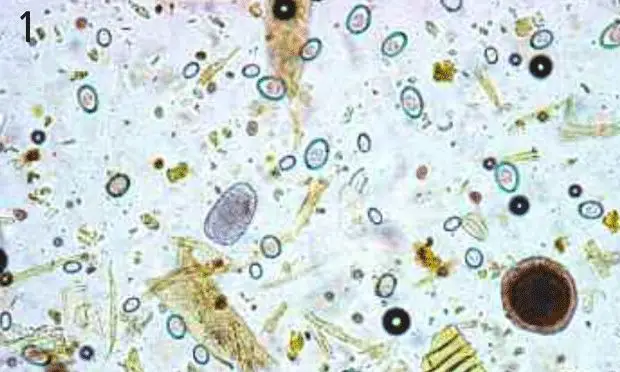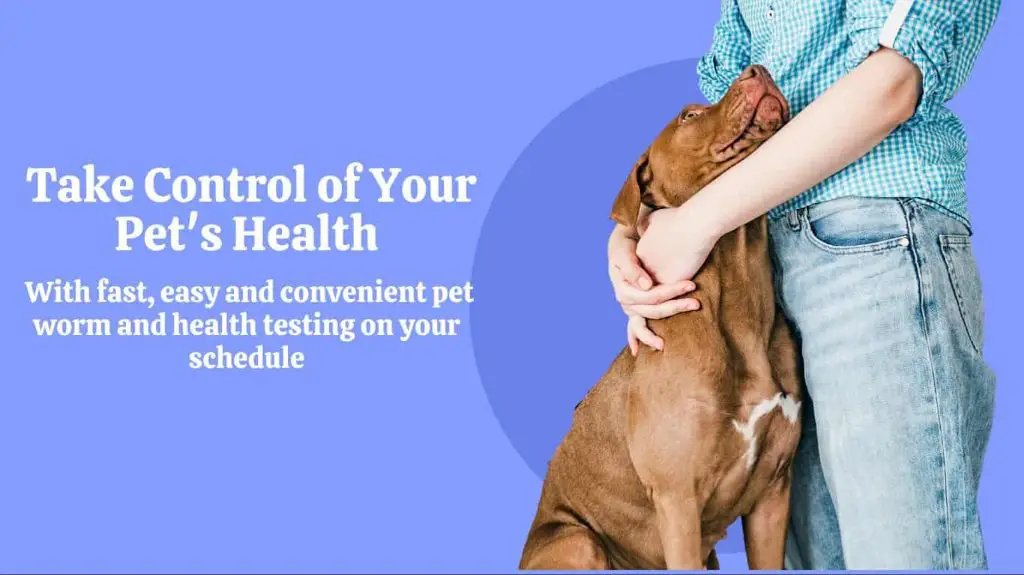Introduction
Dog owners may wonder if their pet can pass worms on to them through activities like licking or being in close contact. This is an important concern, as some worm species that infect dogs can also infect humans and pose health risks. The purpose of this article is to provide a comprehensive overview of the different types of dog worms, how dogs get infected, how these worms can be transmitted to humans, what symptoms to look out for, and how to prevent transmission.
Types of Worms Dogs Can Transmit
There are several different types of intestinal worms that dogs can transmit to humans through direct contact. The most common include:
- Roundworms – Perhaps the most widespread intestinal worm found in dogs. Roundworm eggs are shed in the dog’s feces and can contaminate soil and water. Humans can accidentally ingest infective roundworm eggs that have been passed through the dog’s feces and become infected.
- Hookworms – Hookworm larvae can penetrate through the skin of humans and cause infection. This often happens when human skin comes into contact with contaminated soil where dogs have defecated.
- Whipworms – Whipworm eggs are extremely resistant and can survive in soil for years. Humans can ingest whipworm eggs spread through contaminated soil and water.
- Tapeworms – There are several tapeworm species found in dogs that can sometimes be passed to humans. This happens when humans ingest tapeworm eggs shed in the dog’s feces through direct contact or contaminated food.
Of these worms, roundworms and hookworms appear to pose the greatest risks to human health when transmitted from dogs. However, all of these intestinal worms have the potential to infect humans under the right circumstances.
How Dogs Contract Worms
Dogs can get infected with intestinal worms in several ways:
Eating Feces or Contaminated Soil
Dogs may ingest worm eggs or larvae when eating feces or soil contaminated with feces. Many worms release eggs into the environment through the infected animal’s stool. These eggs can survive in the soil for long periods.
Fleas and Other Insects
Some worms, like tapeworms, use fleas or other insects as intermediate hosts. When a dog swallows an infected flea while grooming, they can contract tapeworms.
Nursing
Puppies can get roundworms and other worms while nursing if their mother is infected. The worms are transmitted through the milk.
Contaminated Food or Water
Consuming food or water that has been contaminated with feces or soil containing worm eggs or larvae can also lead to infection.
In summary, dogs primarily get worms by accidentally ingesting worm eggs or larvae from contaminated sources in their environment. Proper sanitation and flea control is important to prevent infection.
How Dogs Transmit Worms to Humans

One of the main ways dogs can transmit worms to humans is through licking and kisses. When an infected dog licks a person’s face, mouth or hands, they can accidentally ingest worm larvae or eggs present in the dog’s saliva or on their tongue.
This is especially common with roundworms. Roundworm larvae and eggs are shed through the infected dog’s feces. The larvae can survive in the soil for long periods. If a dog’s feces contaminates the soil or grass in areas where humans frequent, there is risk of transmission. The nearly invisible larvae can be inadvertently ingested when people touch contaminated soil, grass or objects and then touch their hands to their mouth or nose.
Direct contact with an infected dog’s feces is another means of contracting worms. The eggs and larvae can end up on a person’s fingers when touching or picking up dog feces, and then be transmitted to the mouth.
Since young children often put their hands in their mouths or rub their eyes, they are at particular risk of ingesting worm larvae or eggs from contaminated surfaces or soil. Teaching children appropriate hygiene like washing hands after playing outdoors and avoiding contact with dog feces is important.
Worm larvae can also reside in an infected dog’s coat and be transmitted to humans when petting or holding the dog. Overall, any activity allowing potential ingestion of microscopic worm eggs or larvae from an infected dog’s feces, coat or contaminated environment can pass worms to humans.
Symptoms of Worms in Humans
If you have contracted worms from your dog licking you, there are a variety of symptoms you may experience. Some of the most common include:
Digestive issues – Worms can cause nausea, vomiting, diarrhea, gas, bloating, stomach pain, and weight loss.
Fatigue – Parasitic infections sap your energy and make you feel constantly tired.
Cough or wheezing – Certain worms like roundworms and hookworms can migrate to the lungs, leading to respiratory issues.
Rash or itching – Threadworms can cause a rash or itchiness around the bum or thighs.
Fever – Most types of parasitic infections can cause a fever along with flu-like symptoms.
Keep in mind that symptoms depend on the type of worm involved. Not everyone will experience all of these issues. The severity can also vary. Mild infestations may cause minimal problems while a serious worm burden can make you extremely sick. If you suspect you have worms, see your doctor for proper diagnosis and treatment.
Health Risks of Worms
Worm infections can cause severe health complications if left untreated. While symptoms may seem minor at first, worms can lead to dangerous outcomes when allowed to multiply and migrate in the body.
Roundworms for example, absorb vitamins and nutrients from the intestines, robbing the human host of important dietary sustenance. This can lead to malnutrition, vitamin deficiencies, stunted growth and development in children.
Tapeworms can produce cysts in vital organs like the liver, eyes, spine and brain. As the cysts grow over time, they may cause blindness, seizures, tissue damage or organ failure. Cases involving the brain or spinal cord can be especially problematic.
Hookworms drink blood from intestinal capillaries, which can result in iron deficiency and anemia. The blood loss is particularly dangerous in children and pregnant women. Additionally, hookworm larvae migrate through the lungs and can cause pneumonia.
Whipworms can cause rectal prolapse, where sections of the large intestine collapse and protrude from the anal opening, requiring surgery. Heavy whipworm infections combined with malnutrition have even resulted in death in some rare cases.
Overall, worms can lead to inflammatory conditions and infections as they travel through organs. Seeking prompt treatment at the first signs of an infection is vital to avoid any lasting or life-threatening effects.
Testing and Diagnosis
If a doctor suspects a worm infection based on symptoms, they will order laboratory tests to confirm the diagnosis. The main test is a stool sample analysis, where a fresh stool sample is examined under a microscope for the presence of worm eggs or larvae.
Doctors may use various techniques to help detect worms in a stool sample:
- Direct smear method – A small amount of stool is smeared onto a slide, stained, and examined under a microscope.
- Concentration method – The stool sample is processed with a special solution to concentrate any worm eggs present.
- Cellophane tape test – A piece of clear tape is pressed against the anus to pick up eggs, then examined under a microscope.
- Baermann technique – The stool is immersed in a solution to allow larvae to migrate out, then examined.
In some cases, imaging tests like an abdominal X-ray or CT scan may also be used to look for signs of an intestinal worm infection. Blood tests can also sometimes detect antibodies the body produces fighting the worm infection.

Identifying the exact type of worm is important for getting the right medication to effectively treat the infection. The lab technician will examine the shape, size, and appearance of any eggs or larvae found to determine the worm species.
Treatment and Medication
If you or your pet have been diagnosed with a worm infection, there are effective deworming medications available. Some common deworming medications for dogs include:
- Fenbendazole – This broad spectrum dewormer is effective against roundworms, hookworms, whipworms, and tapeworms. It is given daily for 3-5 days.
- Milbemycin Oxime – This monthly heartworm preventative is also effective against hookworms, roundworms, and whipworms.
- Praziquantel – This medication is used to treat tapeworm infections. It is given as a single dose tablet.
- Pyrantel Pamoate – This dewormer is effective against hookworms, roundworms, and pinworms. It is given as a single dose or daily for 3-5 days.
For people infected with worms, common antiparasitic drugs include albendazole, mebendazole, or pyrantel pamoate. These are given in a single dose or over 3-5 days. They are effective at killing roundworms, hookworms, whipworms, and pinworms in the intestinal tract.
Depending on the type of worm infection, effectiveness of deworming medication can range from 90-99% with a single dose. It is important to complete the full course of treatment as prescribed by your veterinarian or doctor to fully eliminate the parasites.
In some cases, follow up fecal tests may be recommended after treatment to confirm the infection has cleared. For recurrent infections, repeat deworming may be needed. Keeping up with routine deworming of dogs and proper hygiene can help prevent reinfection.
Prevention
There are several ways to help prevent the transmission of worms from dogs to humans:
- Deworm your dog regularly. Work with your veterinarian to determine the right deworming schedule and medication for your dog. Puppies should be dewormed every 2 weeks until 12 weeks old, then monthly until 6 months old. Adult dogs should be dewormed at least 1-4 times per year depending on risk factors.
- Wash your hands thoroughly with soap and warm water after playing with your dog, cleaning up after them, or handling their toys/bedding. This is especially important before eating.
- Clean up your dog’s feces from the yard frequently. Some types of worm eggs can survive in the environment for long periods.
- Avoid dog parks and areas with high dog traffic. Pick up after your dog when on walks to reduce environmental contamination.
- Bathe and groom your dog regularly to reduce the chance of eggs sticking to their fur.
- Discourage behaviors like licking faces and sharing food/water. Do not allow dogs to lick open wounds.
- Control fleas on your dog. Some worms are transmitted by fleas after ingesting worm eggs.
- Have a fecal test performed periodically to check if your dog has worms.
- Treat any worms in family members to prevent spreading back to your dog.

By maintaining good prevention habits, the risk of transmitting worms from dogs to humans can be greatly reduced.
Conclusion
Dogs can contract and transmit parasitic worms to humans through their feces. Roundworms, tapeworms, hookworms, and whipworms are some of the most common types that can be passed from dogs to humans. Worm infections often do not show symptoms, but can lead to malnutrition, intestinal blockages, and impaired development in children. Regular deworming, flea and tick prevention, cleaning up feces promptly, and washing hands after handling pets can help prevent human transmission.

This article summarized the main types of worms dogs can give humans, how the transmission occurs, the potential health complications, diagnosis and treatment options, and preventative steps. While not common, worms can be transmitted from dogs to humans after contact with infected feces. However, vigilant pet owners can protect themselves and their family by ensuring their dog receives routine deworming and parasite prevention. Keeping the yard free of feces, washing hands after playing with pets, and cleaning any contaminated surfaces can also reduce risk. If you suspect you or a family member may have contracted worms, see a doctor for proper diagnosis and treatment. With proactive prevention and care, dogs and humans can safely coexist without parasitic infections.